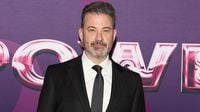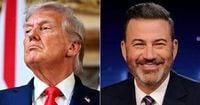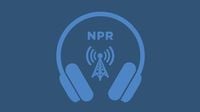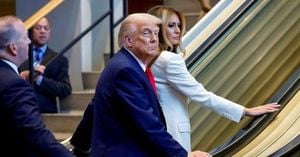On September 23, 2025, the late-night television landscape was rocked back to life as Jimmy Kimmel returned to his post as host of "Jimmy Kimmel Live!" after a week-long suspension. But Kimmel’s comeback wasn’t just another showbiz headline—it quickly became a lightning rod for a fierce national debate about free speech, political influence, and the increasingly tangled relationship between media, government, and the law.
Former President Donald Trump wasted no time in responding to Kimmel’s reinstatement, launching a barrage of criticism at ABC and its parent company, Disney. Posting to his Truth Social platform, Trump declared, “I can’t believe ABC Fake News gave Jimmy Kimmel his job back. The White House was told by ABC that his Show was cancelled! Something happened between then and now because his audience is GONE, and his ‘talent’ was never there.” Trump, never one to mince words, went further, calling Kimmel “yet another arm of the DNC” and suggesting that the network’s decision amounted to an “Illegal Campaign Contribution.” He threatened legal action, writing, “Let’s see how we do. Last time I went after them, they gave me $16 Million Dollars. This one sounds even more lucrative. A true bunch of losers! Let Jimmy Kimmel rot in his bad Ratings.” (Forbes, SAN, and other outlets).
This wasn’t just bluster—Trump’s history with media lawsuits is long and well-documented. According to SAN, Trump previously settled a defamation lawsuit against ABC News, with the network agreeing to donate $15 million to his presidential library. He’s also taken legal action against CBS, The Wall Street Journal, CNN, and The New York Times, though his courtroom victories have been mixed at best. In fact, as SAN pointed out, no other sitting president has pursued the press in court since Theodore Roosevelt in 1908.
What triggered this latest round of hostilities? Kimmel’s initial suspension came after a monologue in which he referenced the assassination of conservative activist Charlie Kirk. The network cited the segment as “ill timed and thus insensitive.” The controversy deepened when Brendan Carr, chairman of the Federal Communications Commission (FCC) and a Trump appointee, publicly suggested that Kimmel could be removed from the air “the easy way or the hard way.” Carr even hinted at potential regulatory action against ABC if the network didn’t comply, stating, “These companies can find ways to change conduct to take action on Kimmel or, you know, there’s going to be additional work for the FCC ahead.” (SAN, The New York Times).
Kimmel’s return was met with anticipation and scrutiny. His 18-minute monologue—part confessional, part defense of free speech—quickly garnered over 11 million views on YouTube, according to SAN. “I’ve had the opportunity to meet and spend time with comedians and talk show hosts from countries like Russia, countries in the Middle East, who told me they would get thrown in prison for making fun of those in power, and worse than being thrown in prison,” Kimmel told his audience, his voice at times wavering. “They know how lucky we are here. Our freedom to speak is what they admire most about this country. And that’s something I’m embarrassed to say I took for granted until they pulled my friend Stephen [Colbert] off the air and tried to coerce our affiliates … to take my show off the air. That’s not legal, that’s not American, that is un-American.”
Yet, not everyone was moved by Kimmel’s words. Critics, especially on the right, lambasted his performance. Jack Posobiec, a conservative activist, took to X to accuse Kimmel of playing the victim: “Look at Jimmy ‘The Martyr’ Kimmel fake crying tonight. Deny, Attack, Reverse Victim and Offender. DARVO playbook. This is what they do.” Scott Jennings, a conservative pundit, added, “You used the phrase ‘MAGA gang’ & then lied about what happened. You definitely intended to make light of it and mislead the American people. Pathetic.” (The New York Post, X).
Meanwhile, legal experts were quick to weigh in on Trump’s threat to sue ABC, pointing out that his claims of illegal campaign contributions were unlikely to hold water. As campaign finance attorney Brett Kappel explained to Forbes, Kimmel’s comments are “clearly covered by the ‘media exemption’” in federal campaign finance law. This exemption allows media companies to broadcast political commentary—even content that favors a particular candidate—without it being considered a contribution, so long as the media outlet is not owned by a political party or candidate. The Federal Election Commission (FEC) has consistently upheld this principle, ensuring that news stories, editorials, and even entertainment programming are protected, provided they’re within the scope of the company’s usual work as a press entity.
Rick Hasen, an election law expert, went further, calling Trump’s approach “incredibly alarming.” In a blog post, he wrote, “There is no credible claim, despite Trump’s insinuation, that ABC is ‘owned or controlled by’ the Democratic National Committee, just as there would be no credible claim that The New York Times or any other liberal-leaning media outlet is.” Hasen argued that “going after a media company in an effort to secure a ‘lucrative’ settlement just because the media company engages in speech critical of the President is extremely antithetical to how a system of self-government with free elections is supposed to work.” (Forbes).
The FCC’s role in this saga has also come under scrutiny. Brendan Carr, who authored a chapter for the Heritage Foundation’s Project 2025—a blueprint for a more conservative government—has advocated for expanding the FCC’s mandate and shaping what appears on broadcast airwaves. According to The New York Times, Carr believes in a congressional mandate to ensure that broadcast serves the public interest, a stance that some see as an attempt at censorship. Others, like Jason Smith, vice chairman of Sinclair Broadcast Group, support Carr’s push for more regulatory action, telling People Magazine, “This incident highlights the critical need for the FCC to take immediate regulatory action.”
Notably, voices from the comedy world have also entered the fray. Joe Rogan, a prominent comedian and podcaster, argued on his show, “I definitely don’t think that the government should be involved ever in dictating what a comedian can or cannot say in a monologue.” His comments reflect a broader unease about the government’s role in policing speech, even when that speech is controversial or offensive.
As of September 24, 2025, no lawsuit had yet been filed by Trump against ABC, but the rhetoric and threats have already had a chilling effect, according to legal scholars. Professor Timothy Zick, author of “The First Amendment in the Trump Era,” noted that even lawsuits with little legal merit can “exhaust, intimidate, and silence opponents.”
For now, Jimmy Kimmel remains on the air, his audience swelling and his detractors as vocal as ever. The debate over where the lines should be drawn between satire, political speech, and corporate responsibility continues to rage—on television, in the courts, and across America’s living rooms.






